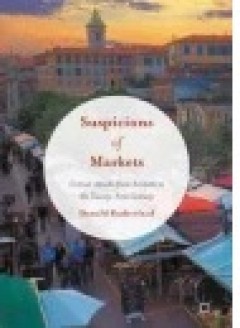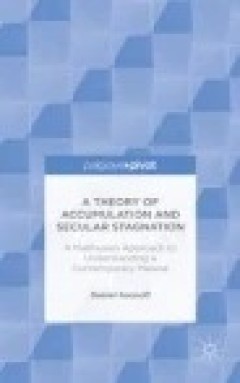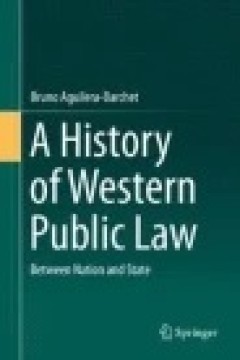Filter by

Essays on New Institutional Economics
This collection of essays comprises some of Rudolf Richter’s important contributions to research on New Institutional Economics (NIE). It deals with the central idea, principles, and methodology of New Institutional Economics and explores its relation to sociology and law. Other chapters examine applications of NIE to various microeconomic and macroeconomic issues in the face of uncertainty, …
- Edition
- -
- ISBN/ISSN
- 978-3-319-14154-1
- Collation
- 2 b/w illustrations
- Series Title
- -
- Call Number
- -

Essays in the History of Irish Education
This book provides a complete overview of the development of education in Ireland including the complex issue of how religion can coexist with education and how a national identity can be aided through Irish language teaching. It also offers a comprehensive exploration of the development, issues, challenges and future of education in Ireland within the context of historical studies.
- Edition
- -
- ISBN/ISSN
- 978-1-137-51482-0
- Collation
- XVII, 393
- Series Title
- -
- Call Number
- -

Essays in Contemporary Economics A Festschrift in Memory of A. D. Karayiannis
This book is a collection of original essays grouped into four parts under the headings “Greece and European integration,” “Issues in the Methodology of Economics,” “Institutions and the Free Market Economy,” and “Insights for Today from Ancient Greece.” The essays appeal to both researchers in the corresponding fields of knowledge and also to policy makers who are looking for i…
- Edition
- -
- ISBN/ISSN
- 978-3-319-10043-2
- Collation
- 3 b/w illustrations
- Series Title
- -
- Call Number
- -

Ernst Zermelo An Approach to His Life and Work
This biography sheds light on all facets of the life and the achievements of Ernst Zermelo (1871-1953). Zermelo is best-known for the statement of the axiom of choice and his axiomatization of set theory. However, he also worked in applied mathematics and mathematical physics. His dissertation, for example, promoted the calculus of variations, and he created the pivotal method in the theory of …
- Edition
- -
- ISBN/ISSN
- 978-3-662-47997-1
- Collation
- 43 b/w illustrations
- Series Title
- -
- Call Number
- -

Suspicions of Markets
In this work, Rutherford reviews why Adam Smith, Hayek, Mises and others praised economic markets, with a view to understanding, in contrast, historical attacks on markets dating as far back as Aristotle. The market has long been criticized as an inappropriate method of allocation, encouraging market participants to misbehave for the sake of personal gain, and creating an impersonal new market …
- Edition
- -
- ISBN/ISSN
- 978-3-319-40808-8
- Collation
- VI, 194
- Series Title
- -
- Call Number
- -

Episodes in the Mathematics of Medieval Islam
This book presents an account of selected topics from key mathematical works of medieval Islam, based on the Arabic texts themselves. Many of these works had a great influence on mathematics in Western Europe. Topics covered in the first edition include arithmetic, algebra, geometry, trigonometry, and numerical approximation; this second edition adds number theory and combinatorics. Additionall…
- Edition
- -
- ISBN/ISSN
- 978-1-4939-3780-6
- Collation
- 137 b/w illustrations
- Series Title
- -
- Call Number
- -

A Wealth of Buildings: Marking the Rhythm of English History Volume I: 1066�…
This two-volume book explores how the great buildings of England bear witness to a thousand years of the nation’s history. In every age, investment in iconic buildings reaches a climax when the prevailing mode of production is operating most effectively, surplus wealth is most plentiful, and the dominant class rules supreme. During such periods of stability and prosperity, the demand for new …
- Edition
- Ed. 1
- ISBN/ISSN
- 978-1-137-31921-0
- Collation
- XXVI, 337
- Series Title
- -
- Call Number
- 330 BAR w

A Theory of Accumulation and Secular Stagnation
Thomas Malthus identified a crucial tension at the heart of a market economy: While an accumulation of wealth is necessary to provide the capital investment needed to generate growth, too much accumulation will cause planned saving to exceed profitable investment, which will result in secular stagnation, a condition of low growth and underemployment of resources. Keynes drew inspiration from Ma…
- Edition
- Ed. 1
- ISBN/ISSN
- 978-1-137-56221-0
- Collation
- VIII, 136
- Series Title
- -
- Call Number
- 332 ARO t

A Revolution in Economic Theory: The Economics of Piero Sraffa
This book draws on the work of one of the sharpest minds of the 20th century, Piero Sraffa. Ludwig Wittgenstein credited him for 'the most consequential ideas' of the Philosophical Investigations (1953) and put him high on his short list of geniuses. Sraffa's revolutionary contribution to economics was, however, lost to the world because economists did not pay attention to the philosophical und…
- Edition
- -
- ISBN/ISSN
- 978-3-319-30616-2
- Collation
- XVII, 244
- Series Title
- -
- Call Number
- 330 SIN r

A History of Western Public Law: Between Nation and State
The book outlines the historical development of Public Law and the state from ancient times to the modern day, offering an account of relevant events in parallel with a general historical background, establishing and explaining the relationships between political, religious, and economic events.
- Edition
- Ed. 1
- ISBN/ISSN
- 978-3-319-11803-1
- Collation
- -
- Series Title
- -
- Call Number
- 340.1 AGU h
 Computer Science, Information & General Works
Computer Science, Information & General Works  Philosophy & Psychology
Philosophy & Psychology  Religion
Religion  Social Sciences
Social Sciences  Language
Language  Pure Science
Pure Science  Applied Sciences
Applied Sciences  Art & Recreation
Art & Recreation  Literature
Literature  History & Geography
History & Geography